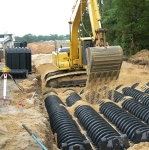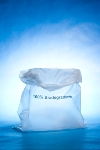The first scientific results from an ambitious voyage led by a group of graduate students from Scripps Institution of Oceanography at UC San Diego offer a stark view of human pollution and its infiltration of an area of the ocean that has been labeled as the "Great Pacific Garbage Patch."
the 20 million larvae of the plant are able to ingest a ton of waste per day, showing that this technology is much more effective and faster than other conventional techniques of traditional composting and vermicomposting, which removes the residue with earthworms.
CBI Polymers LLC, the innovator of DeconGel® nuclear decontaminant, will join the broad-based philanthropic effort to help with the crisis in Japan by making a donation of $250,000 in radiological decontamination products and technical services at the request of the Japanese Medical Association.

When St. Augustine Prep School in Richland, N.J., decided to expand its facilities, it focused on maintaining the school’s historically strong environmental commitment. What it didn't realize, though, is that the wastewater treatment system it had implemented was unable to handle the capacity of wastewater the school generated.
While spent nuclear fuel continues to pile up by the ton across the United States, UC Irvine’s Mikael Nilsson says the solution is clear: recycle it at the commercial nuclear power plants that create it.
In addition to its damaging effect on the environment and its illegal smuggling into developing countries, researchers have now linked e-waste to adverse effects on human health, such as inflammation and oxidative stress – precursors to cardiovascular disease, DNA damage, and possibly cancer.
The Chattanooga area has made significant progress in improving air quality and has reached an important clean air milestone, but the state was put on notice to lean up toxic waste from TVA coal plant.

Research from North Carolina State University shows that so-called biodegradable products are likely doing more harm than good in landfills, because they are releasing a powerful greenhouse gas as they break down.
The chemicals removed included flammables, oxidizers, corrosive acids, corrosive bases, toxics, and non-regulated materials.
EPA has developed three options to address contaminated soil at the former lagoons and has selected excavation and off-site disposal of the contaminated soil as its preferred alternative.
Vermont Gov. Peter Shumlin signed into law a bill that requires manufacturers of mercury-containing lamps to establish and finance a recycling program for spent bulbs from residents and small businesses.
NOAA and the University of Georgia have teamed up to create a new, innovative cell phone reporting mechanism to combat the marine debris problem.
Billions of dollars lost each year as waste heat from industrial processes can be converted into electricity with a technology being developed at the Department of Energy's Oak Ridge National Laboratory.
Region 7’s latest round of CAFO enforcement activity, aimed at encouraging producers’ compliance with the Clean Water Act and the National Pollutant Discharge Elimination System (NPDES) permitting program, involves seven beef feedlots, including four in Iowa, two in Kansas and one in Nebraska.
Autocar announced the launch of its E3 advanced series hybrid cab/chassis, the culmination of a rigorous testing and validation program that follows the successful implementation of a pre-production E3 fleet in service in the greater Miami area.
Cascade Engineering’s Pink Cart is a new program developed in collaboration with the American Cancer Society that will enable households and businesses nationwide to make an important and visible demonstration of their support for the fight against breast cancer.
Chief enginner ordered subordinates to illegally pump oil-contaminated waste directly into the ocean, most commonly through a "magic pipe."
Grease Vault is designed for secure storage and easy emptying of food grease.
The show, which bills itself as the largest event in North America serving the $75 billion solid waste and recycling industry, takes place May 10 to 12 at the Dallas Convention Center in Dallas, Texas.
Attendees at the WasteExpo show can receive an up-close view of GaiaRecycle’s patented “double helix” shredder and blade technology, and learn how the company's systems accelerate the organic decomposition process based on drying, sterilizing and grinding mixed food scraps and organic waste.